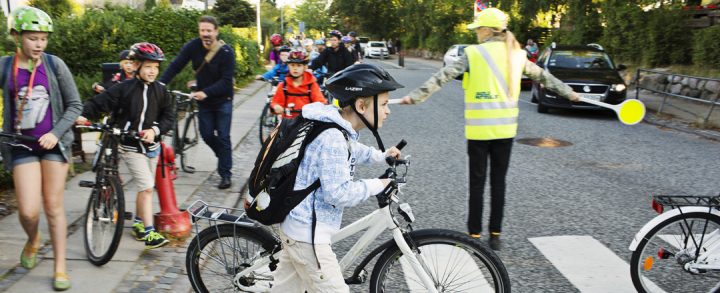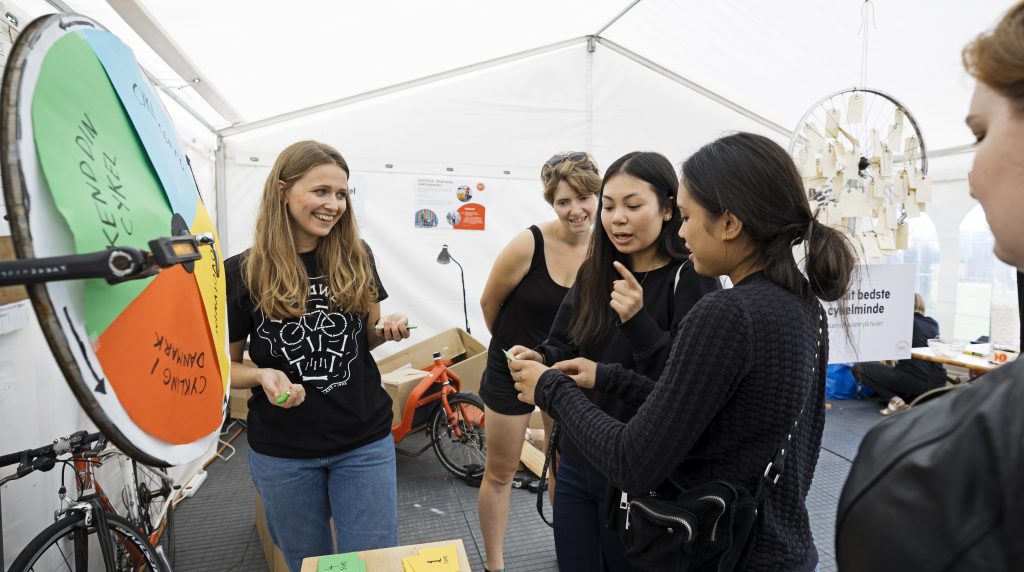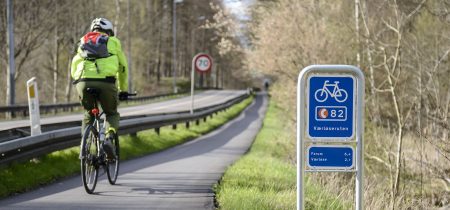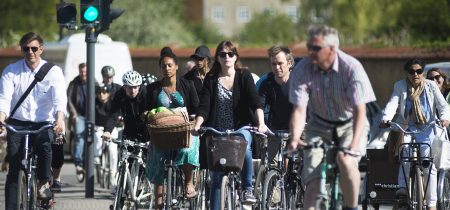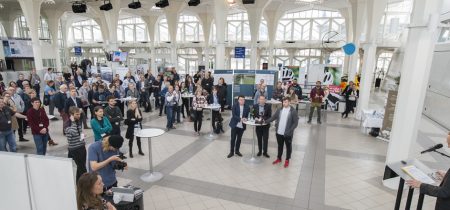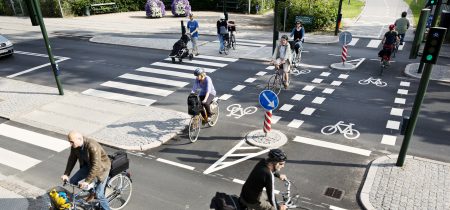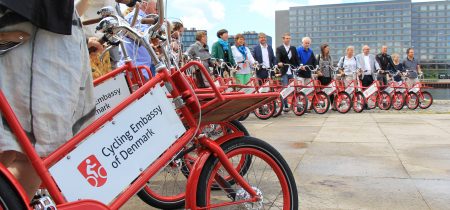Danish Cyclists’ Federation’s role – local, national, and international
Danish Cyclists’ Federation was founded in 1905 when the growing number of Copenhagen cyclists needed a common voice as they struggled for space among the city’s many horse-drawn wagons and carriages.
By Klaus Bondam, Danish Cyclists’ Federation
Since then there have been several radical shifts in the traffic scene, but cyclists today play an important role in Danish cities, thanks partly to the association, which for more than a century has managed to renew itself and keep abreast of changing times, and cyclists’ changing needs and wants.
A brand new core narrative
As recently as 2018 Danish Cyclists’ Federation launched a new core narrative closely linking everyday cycling and the UN sustainable development goals, also known as the 2030 Agenda. The focus is on cycling as part of the solution to many of the challenges confronting us today, both at home and globally.
“For generations cycling has made a great difference for our everyday lives, our health, our environment, and our cities. The strong Danish cycling culture and its contribution to the good life is a result of personal choice and good political prioritization.
This must be maintained and reinforced. Now more than ever is it critical that more people choose to cycle. Altogether too many Danes die too early due to an inactive lifestyle. The roads in and around our cities are choking in traffic queues and congestion. Our world is threatened by massive, global climate challenges.
This is why in Danish Cyclists’ Federation we work hard to achieve the political priorities that will enable everyone to choose an active, healthy everyday life, thereby releasing the strong cycling culture’s enormous social potential. “
Danish Cyclists’ Federation and the United Nations Sustainable Development Goals
Denmark, as well as the governments of other countries of the UN, has adopted the United Nations 17 sustainable development goals, and is thus committed to working to achieve a sustainable future.
Danish Cyclists’ Federation’s work reinforces the realization of five of the UN goals:
Goal 3 – Good health and well-being for people
Goal 11: Sustainable cities and communities
Goal 12: Responsible consumption and production
Goal 13: Climate action
Goal 17: Partnerships for the goals
Read more about the UN goals on http://un.dk/da/om-fn/verdensmaalene/
The Danish Cyclists’ Federation Secretariat
The Danish Cyclists’ Federation is located in Copenhagen. It has more than 20 staff members and engages in a broad range of activities.
Its core task is running a member organization consisting of more than 16,000 members, who in addition to supporting the association’s political work are also eligible for discounts in the association’s bike shop and workshop as well as from other partners.
In addition, the association publishes a member magazine CYKLISTER four times a year, which has a highly visible presence on a number of social media, and regularly sends out newsletters.
The association has carried out a long list of campaigns over the past 20 years, alone and in collaboration with other organizations. Two of the most notable are:
All Kids Bike – an annual, nation-wide school campaign with more than 100,000 children participating
We Bike to Work – an annual, nation-wide workplace campaign with more than 65,000 annual participants
In addition, the association has further developed the concept by arranging cycling games for preschoolers. The concept has been adopted by several local authorities as a permanent activity for the next generation of cyclists.
The secretariat also carries out extensive lobbying activities. The association seeks to ensure that cyclists’ current needs are constantly visible in the political debate by arranging communication initiatives and meetings with politicians, and by its presence on a number of public advisory boards.
Danish Cyclists’ Federation handles the secretariat function of the Cycling Embassy of Denmark and the municipal cycling council and shares office space with Danish Cycling Tourism. In addition the association is one of the founders of the ECF (European Cyclists Federation) with headquarters in Brussels, which focuses on making cycling visible in the European debate.
Danish Cyclists Federation’s membership democracy
The Danish Cyclists Federation’s highest authority is the annual general meeting, which is held in the month of October at different locations around the country. The meeting lasts for a weekend. The first day deals with organizational formalities, and the second day is dedicated to giving the participants new knowledge and inspiration.
All members of the association are welcome to participate in the general meeting, but only certain delegates from the local branches and representatives may vote. The general meeting elects the association’s national chairman as well as 8 members and 2 alternates to the organization’s board of directors.
The board meets 5-6 times annually and in the spring holds a so-called department seminar where board members of the local branches meet to discuss relevant topics. Department seminars are in the nature of further education for the organization’s active members.
The association’s national chairman meets about once a month with the director and the deputy-director for updates on daily operations and strategic development, and to prepare meetings of the board.
Each member of the board is responsible for on-going contact with a number of local branches thereby ensuring good communication among all the organization’s fora, especially with the work of the secretariat.
Both the chairman and the director regularly send out written briefings to all members of the boards of the local branches.
Danish Cyclists’ Federation’s local branches
The association has 41 branches today, spread over the entire country. In a number of municipalities without a local branch there is a so-called representative instead. The work of the local branches is primarily based on volunteers. Consequently each branch has its own profile depending on the competencies and interests of the individual branch.
The primary function of the local branches and the representatives is to maintain contact with the local authorities and enter into dialogues and activities with the citizens. The focus is on several concrete areas, including:
Impartial assessment of local cycling conditions
Formulate a cohesive municipal cycling strategy
Mobilize citizen support for new cycling initiatives
Arrange cycling trips, courses, and events for younger and older citizens
Lobby local officials, local politicians, and MPs
Provide the local press with stories about cycling
The average age of members of the Danish Cyclists’ Federation is comparatively high, which is also true of other voluntary organizations. Consequently, the association is currently working on developing new types of organization with a greater appeal to younger people and their approach to political, activist work.
Good cooperation with the local authorities
Experience shows that cooperation between the local authority and Danish Cyclists’ Federation works best if there is a matching of expectations prior to the project.
The branches’ volunteers are fueled by personal engagement, which is extremely valuable to the local authority. However, the local authority may not be able to invest as many resources as the volunteers would like. Consequently an early matching of expectations and roles is important as it encourages the volunteers to act as the authority’s constructive co-players.
Meetings between the parties early in the process can clarify whether the local authority and Danish Cyclists’ Federation’s local branch actually have a common cause. Their interests will often coincide, in which case Danish Cyclists’ Federation is invaluable when it comes to creating credibility and mobilizing popular support, both in relation to the political process and in relation to selling the project to the local media.
Public statements and press releases are essential to the partnership. There may very well be situations where the parties have different opinions and views. The expression of diverging views may be part of the cooperative relationship, but a climate of trust is best enhanced when the parties have briefed each other in advance so new public statements don’t come as a surprise.
The local authorities are always welcome to contact the secretariat in Copenhagen for advice, guidance, or simply as a sparring partner. In addition, the Secretariat is always open for dialogues with the municipalities that are part of the Road Directorate’s Danish National Cycling Conference, the Municipal Cycling Council (Det kommunale cykelfagråd), the Danish Road Safety Council, the Cycling Embassy of Denmark, and a number of other central fora.
Many local authorities have expressed satisfaction with an excellent cooperative relationship with Danish Cyclists’ Federation, owing to high degree of mutual respect and the common desire to develop bicycle traffic on the local level.
See also. www.cyklistforbundet.dk


